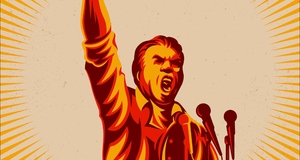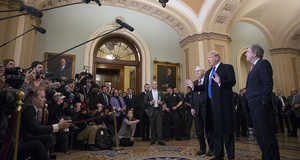Featured Article:Facts, Beliefs, and the Brain: How Propaganda, Ideology, and Donald Trump Inhabit the Group Mind
By
2017, Vol. 9 No. 10 | pg. 2/2 | « The Adaptive Functions of “My-Side Bias”As it turns out, Mercier and Sperber show that “myside bias” had an “adaptive function” and it works within groups to protect us as individuals from getting hurt, or “screwed” by other members of our own group. Once again, according to Kolbert: “Humans…aren’t randomly credulous. Presented with someone else’s argument, we’re quite adept at spotting weaknesses. Almost invariably, the positions we're blind about are our own, ” (2017). Living in small groups as hunter-gatherers, our ancestors’ main concern was with their social standing, and with insuring that they were not the folks risking their lives on the hunt while others relaxed back at cave. Reasoning clearly was less important than winning arguments. Our ancestors, for example, were not concerned about the deterrent effects of capital punishment. They did not deal with philosophy or theory, or false news, fake stories, the social network or Twitter. Reason may seem to fail us today because as Mercier and Sperber argue we live in an environment that changed more quickly than human natural selection could adapt, (Mercier and Sperber). What if human beings are unsuited to deal with the technological world of communication and ideas that exists today? Is it possible that the evolutionary traits that helped humanity succeed are working against us in this new environment? Steven Sloman and Philip Fernbach, in their book (2017) The Knowledge of Illusion: Why We Never Think Alone, also believe that sociability played the predominant role in how the human mind functions and malfunctions. According to Elizabeth Kolbert (pp. 6-7), these cognitive scientists demonstrate that people believe they know much more than they actually do about the world. In recent studies at Yale, students could not explain the functions of flush toilets, zippers, cylinder blocks, and much more. We laugh when we say that we cannot use most of the electronics we have in our home, but perhaps it should be a cause for some concern. Our persistence in our belief that we know more than we do essentially relies on other people. Whether we are talking about flush toilets, or I-Pods, Smart Phones, or digital televisions or laptop computers—human beings have been relying on the knowledge and expertise of other people since we began hunting in groups. We blissfully delude ourselves that we know how things work when in fact we are actually collaborating with other people. People share knowledge and understandings in such a way that we cannot perceive where our ignorance ends and our authentic knowledge actually begins. By and large, people do not have clear borders between their ideas and beliefs, and their actual knowledge. It is a kind of confusion , but essential to human progress. We use tools—but we do not have to invent new tools every time we wish to use them. Can you imagine if every generation had to re-invent the wheel, or the shovel, rake, or even the spoon? We need not learn the principles of an internal combustion engine to drive an automobile—nor understand digital electronics to program a television set. The main problems arise according to the research of Sloman and Fernbach when people move into the terrain of politics. [Here you can see the functionality of ideology as a filter; ideology simplifies a complicated world and allows (or calls) people to take action and make choices that they otherwise lack the knowledge to make]. Consider the difference between flushing a toilet and selecting a policy to manage Illegal Immigration, or to invade another country like Afghanistan? We assume knowledge enough to vote and make choices about politicians and leaders who argue for policies dealing with far away countries like Russia, North Korea or Afghanistan, or laws like Immigration policy, the Affordable Health Care Act, Tax Reform, Criminal justice reform, Military Strategy, and much more. Even so—as people engage in making decision about these issues, they may know far less about those things than the operation of a zipper. In fact, Sloman and Fernbach’s research says that, “As a rule strong feelings about issues do not emerge from deep understanding,” (Sloman and Fernbach, 2017)). Our dependence on the minds and arguments of others becomes dominant in our thinking processes. Our thinking becomes the thinking of those we agree with—and despite their lack of knowledge—seems to support what we think. In the end, as Elizabeth Kolbert said: “If we all now dismiss as unconvincing any information that contradicts our opinion, you get, well, the Trump Administration,” (Kolbert, 2017, p. 7).A community of “knowledge” becomes dangerous as we continually express opinions without data and analysis. This is what we often refer to as the “narrative,” and the process concerns the manner which stories are shaped and then which stories dominate the social and historical landscape. For a long time, Science has been a system for correcting our worst inclinations as human beings. Returning to questions posed by Peter Peregrine, we may shudder to ask: “Are we re-entering a pre-Enlightenment world?” Are we returning to the Middle Ages when authority and the group mind blocked the rise of new and scientific ideas that changed the world? Scientific inquiry has no place for “confirmation bias.” Undoubtedly, access to empirical truths and material data probably accounts for the massive success of science over the last 300 years—and why we need a Political Science today more than ever.
The Illusion of KnowledgeElizabeth Kolbert also examined the research of Jack and Sara Gorman (2016) and their book Denying to the Grave: Why We Ignore the Facts That Will Save Us. The Gorman’s studied persistent beliefs that are not only demonstrably false, but possibly deadly. For example, the conviction held by many people that vaccines are hazardous, and may lead to birth defects and disease, is persistent despite the massive palliative effect of vaccinations over time. Without the polio vaccine for example, the world would yet be battling this painful disfiguring disease. “Anti-vaxxers” (as they are called) are obstinate in their beliefs although there is no common or scientific link between immunization and mass birth defects, seizures or autism. At the same time there is scientific evidence to the contrary. The real hazard we face in society is not being vaccinated, and that is something we can empirically measure. So, what does America do when it has a President who has shared the “Anti-Vaxxers” world view? Suggestively, the Gorman’s research found that this kind of self-destructive thinking had some adaptive value in human biology. Apparently, human beings get a rush of dopamine-- hence a physiological reaction—when they process information that supports their pre-existing beliefs. We should not be surprised that blasting off our own opinions actually “feels good,” and it may account for why people become so agitated when confronted by opinions that challenge their own. In other words, it feels good to “stick to our guns,” even when we are as wrong as sin and suffering. (This perhaps helps to explain so many ruined family gatherings). Common sense and science tells us that vaccines are good for kids, and handguns are not. The data are clear. Having said that, providing people with the information that owning a gun does not make you safer, or that vaccines save lives, will not change minds. Such information will be discounted. In another example, many folks believe that the economy always does better under Republican Presidents. In fact, between 1949 and 2009, the US gross domestic product has been higher under Democratic Presidents. In addition, Democratic Presidents have been more likely to reduce inequality—and have contributed less to the national debt since 1945 as a percentage of GDP. In another example, many people believe: “The government spends a lot of money on welfare,” but in fact 8% of the total 2014 US budget was devoted to “welfare” benefits. Many people believe violent crime is on the rise, but over the last decade violent crime has fallen. In fact—since 1991 violent crime has fallen by 50%. Murder rates between 1993 and 2010 dropped by 49% and general violent crime has fallen by 72% since 1993. So why do people prefer to believe what is not true—including empirical truths that would not only make us feel safer, but would actually improve our security? (Hochschild, 2017) The answer lies in part in our human desire to belong. Our group identity forces us to seek comfortable answers that insure group acceptance and make us feel good and comfortable. It is also much easier to not change beliefs. This behavior is reinforced because human beings have learned that we do not really need to know how things work to get along and succeed. The brain seeks the easiest way to accomplish any goal, which generally speaking, has been a good thing in human evolution. We also know from long historical experience that emotion and passion can often defeat scientific understandings. Science requires our brains to work harder; actually understanding and knowing the truth is challenging. For example, Kellyanne Conway’s “alternative facts” are a good fit for the current times. Alternative facts, and acting on passions, authority, anger and fear—is faster and easier—and will always be tempting to people. In politics—this has always been true and it is something the philosophers have warned about for millennia. In fact, it is one of the main things Madison warned about in Federalist No. 51: ”But what is government, but the greatest of all reflections on human nature? If men were angels, no government would be necessary,” (Madison, The Federalist, 2001). As Kolbert said: “These days it can feel as if the entire country has been given over to a vast psychological experiment being run by no one, or by Steve Bannon. Rational agents would be able to think their way to a solution. But, on this matter (Kolbert says) the literature is not reassuring,” (Kolbert, 2017). There are many ways to define political ideology, but among the best is to think of ideologies as “patterns of belief.” Ideologies are calls to action, dreams, delusions and nightmares, but they are always a pattern of beliefs organized in such a way as to define the world people see and understand. Ideologies filter out the competing ideas of the political world and simplify complex reality to become not only our calls to action but our personal identities, (Love, 2006). Political ideology in a time where truth is malleable means that just as we might have been ready to embrace the Universal Declaration of Human Rights as a template to a world of decency and sustainability in the future, we may be equally poised to fall prey to lies, deceits, or propaganda of the darkest sort in the service to interests who do not seek the public good. ConclusionProfessor Larry J. Sabato of the Crystal Ball (University of Virginia, Political Science) analyzed polling data in April 2017 that confirmed the following: “Voters who supported President Donald Trump in last year’s election have few regrets as Trump enters his 100th day in office…,” (www.centerforpolitics.org, April 27, 2017). The data (scientifically gathered) confirm that voters who elected Trump show a 93% approval rating, with 42% in “strong approval” and 51% with “somewhat approve.” In addition, 70% of these Trump voters believe the country is now “on the right track,” and two thirds believe the economy is improving since Trump took office. The polling data did reflect that many respondents are concerned about America, using words like “upheaval,” “polarization,” “chaotic,” and “volatile,” to describe the country at this time, but it is hard to know what form these feelings may take in each respondent’s mind. Break down in the “strong approval” categories still show the same characteristics as in the November 2016 election among Trump voters: 44% of “strong approvers” were Men, 39% were women; and respondents over 65 years old were the only age group outnumbering “somewhat approvers” (around 48-46%). Meanwhile “strong approvers” of Trump narrowly outnumbered “somewhat approvers” only among those with a High School education or less. Trump voters with “some” college education were likelier to “somewhat approve” than to “strongly approve.” Trump voters’ approval at the 100 Day mark remained strong in early 2017, and they may not change their minds any time soon in the future. The search for truth relies on the belief that understanding and wisdom matters; that observation and analysis matter; that in politics, lives and passions matter—but so too does knowledge, expertise, and intelligence. One key insight found in the study of propaganda and political ideology is to appreciate the difficulty of changing the embedded beliefs of people. The human community has made the species successful, and over time has selected for the traits that support group identity. The human being needs to belong to the group as much as to be a discrete individual and the research show that group coherence, even when errors in judgment or opinion are dangerous, has aided human survival and dominance. Hence, human beings do not change their minds easily, even when they are wrong, and more important, even after the evidence of error is shown to people. People created and employ political ideology to make political choices and to operate within their social groups successfully. Evolution and biology help us to understand, in part, the powerful role of ideology in organizing human hyper-sociability into integrated patterns of belief. Political ideology authorizes our emotional and unreasonable beliefs to appear to be rational and reasonable. With the aid of propaganda, political ideology works within the group to shape and influence beliefs and bind groups together in action. Political ideology is endemic in the success of any human community, and is more than patterns of beliefs or movements, but the binding force within the shape of political culture itself. ReferencesArendt, Hannah. (2004). The Origins of Totalitarianism. New York: Random House Inc. [1951]. Aristotle. (1940). “The Rhetoric,” in The Basic Works of Aristotle. New York: Random House. Ball, Molly. (2017). “Kellyanne’s Alternative Universe,” The Atlantic, April 2017. Burns, James MacGregor. (1978). Leadership. New York: Harper/Colophon Books. Davidson, Cathy, N. (2011). Now You See It. How Technology and Brain Science Will Transform Schools and Business in the 21st Century. Middlesex: Penguin Books. Firestein, Stuart. (2012). Ignorance: How It Drives Science. New York: Oxford University Press. Gorman, Sara E., and Jack M. Gorman. (2017). Denying to the Grave: Why We Ignore the Facts that Will Save Us. New York: Oxford University Press. Hamilton, Alexander and James Madison, John Jay. (2001). The Federalist. (Gideon Edition). George W. Carey and James McClellan eds. Indianapolis: Liberty Fund. (1787-1788) Hochschild, Arlee Russell, (2016). Strangers in Their Own Land: Anger and Mourning on the American Right. New York: The New Press. Hoffer, Eric. (1951). The True Believer. New York: Mentor Books. Inglehart, Ronald and Pippa Norris. (2016). “Trump, Brexit and the Rise of Populism. Economic Have Nots and Cultural Backlash,” Harvard Kennedy School Faculty Research Working Papers, RWP, 16-026, August. Jowett, Garth S. and Victoria O’Donnell, (2015). Propaganda and Persuasion, 6th ed. Thousand Oaks: Sage Publications. Kolbert, Elizabeth. (2014). The Sixth Extinction: An Unnatural History. New York: Henry Holt and Co. Kolbert, Elizabeth. (2017). “Why Facts Don’t Change Our Minds: New Discoveries About the Human Mind show The Limitations of Reason.” New Yorker Magazine. February 2017. Lord, Charles G., and Lee Ross and Mark Lepper. (1979). “Biased Assimilation and Attitude Polarization: The Effects of Prior Theories on Subsequently Considered Evidence.” Journal of Personality and Social Psychology; Vol. 37 (11), November 1979, 2098-2109. Love, Nancy S. (2006). Understanding Dogmas and Dreams, 2nd edition. Washington D.C.: CQ Press. Mercier, Hugo and Dan Sperber. (2017). The Enigma of Reason. Cambridge: Harvard University Press. Nussbaum, Martha C. (2012). The New Religious Intolerance: Overcoming the Politics of Fear in an Anxious Age. Cambridge: Harvard University Press. Peregrine, Peter Neal. (2017). “Seeking Truth Among ‘Alternative Facts’.” The Conversation. (February 23, 2017). https://theconversation.com/seeking-truth-among-alternative-facts. Sabato, Larry J. (2017). “Center for Politics Poll Takes Temperature of Trump Voters at 100 Day Mark,” Crystal Ball. April 27, 2017. http://www.centerfor politics.org. Sloman, Steven and Philip Fernbach. (2017). The Knowledge of Illusion: Why We Never Think Alone. New York: Riverhead Books. Watson, James. (1980). The Double Helix: A Personal Account of the Discovery of the Structure of DNA. Edited by Gunther Stent. New York: W.W. Norton Company. Compliance with Ethical StandardsThis manuscript is the original research of the author and there was no funding or grant support received or accepted. All conclusions and opinions are the responsibility of the author alone and there is no conflict of interest. This article does not contain studies with human participants or animals performed by the author. Suggested Reading from Inquiries Journal
Inquiries Journal provides undergraduate and graduate students around the world a platform for the wide dissemination of academic work over a range of core disciplines. Representing the work of students from hundreds of institutions around the globe, Inquiries Journal's large database of academic articles is completely free. Learn more | Blog | Submit Latest in Political Science |


















